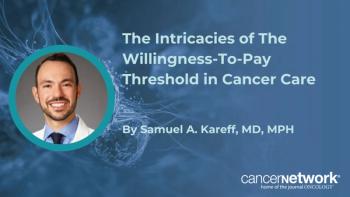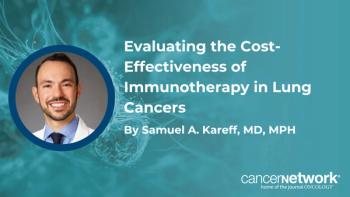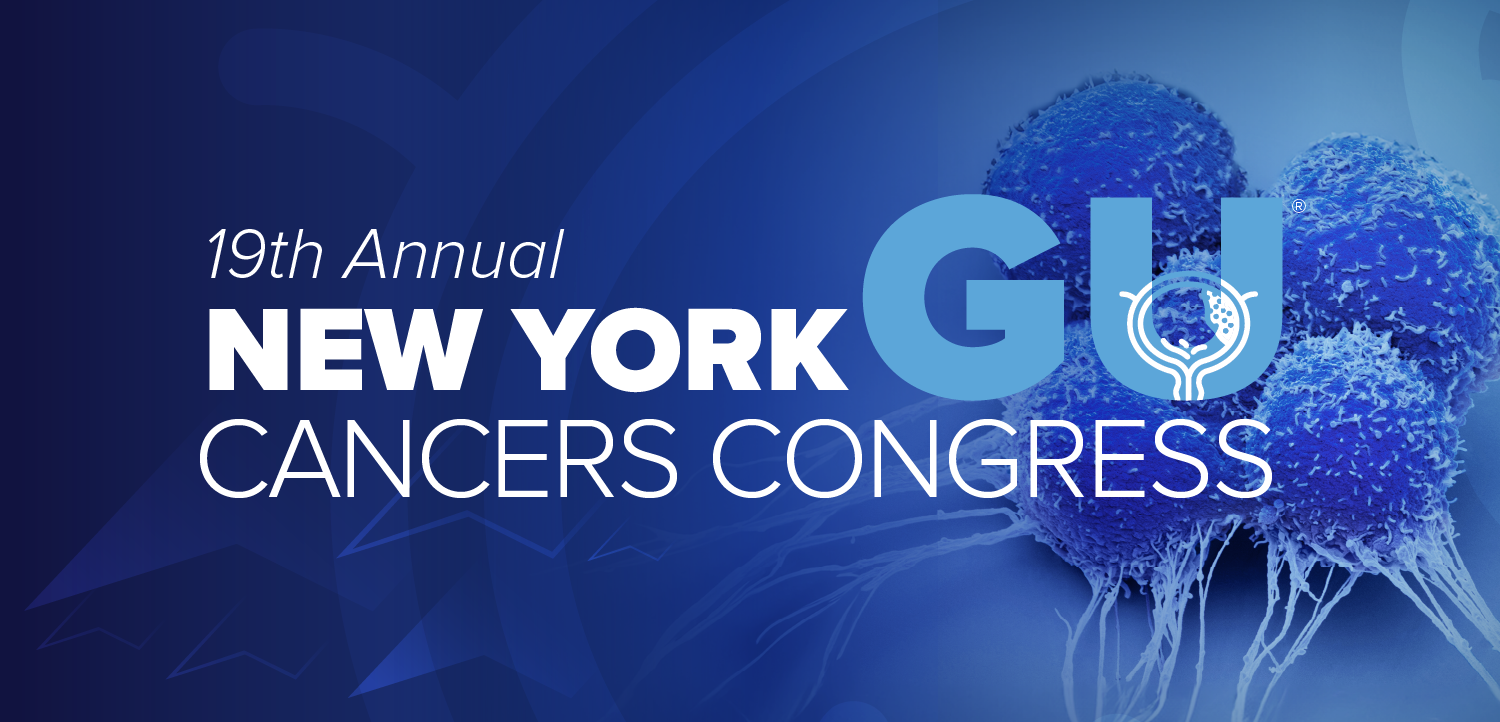
- ONCOLOGY Vol 11 No 10
- Volume 11
- Issue 10
Vinorelbine and Carboplatin in the Treatment of Advanced Non-Small-Cell Lung Cancer
Randomized trials in patients with advanced non-small-cell lung cancer (NSCLC) have demonstrated that the combination of vinorelbine (Navelbine) and cisplatin
ABSTRACT: Randomized trials in patients with advanced non-small-cell lung cancer (NSCLC) have demonstrated that the combination of vinorelbine (Navelbine) and cisplatin (Platinol), compared with vinorelbine alone, increases survival but also increases toxicity. In an effort to enhance survival and reduce toxicity, a phase I/II trial of vinorelbine and carboplatin was conducted. On the basis of the phase I experience in 22 patients, the regimen chosen for evaluation in phase II consisted of vinorelbine 30 mg/m2/week, carboplatin at an area under the concentration vs time curve of 7 (according to the Calvert formula) on a monthly basis, and granulocyte colony-stimulating factor (G-CSF) titrated according to the absolute neutrophil count. As in phase I, neutropenia was the major toxicity observed among the 42 patients in the phase II study. However, the use of G-CSF either in a reactive setting (after the development of neutropenia) or preemptively (prior to the development of neutropenia) limited the episodes of febrile neutropenia. The overall 1-year survival rate was comparable to results obtained with vinorelbine and cisplatin in large-scale trials, with a favorable toxicity profile. These results confirm the clinical activity of vinorelbine plus carboplatin in advanced non-small-cell lung cancer. [ONCOLOGY 11(Suppl 12):44-48, 1997]
The management of patients with advanced non-small-cell lung cancer (NSCLC) remains a daunting task. The majority of patients have inoperable disease that is locally advanced (stage IIIA-B) or metastatic to distant sites (stage IV). Until the past several years, the primary therapy available to patients was radiation treatment and supportive care. Because of the predominantly older population with significant comorbidity as well as the morbidity of the disease itself, advances in treatment have been limited. However, during the past decade, several randomized trials have confirmed a survival advantage with chemotherapy when applied to patients with good performance status who have either stage III or IV non-small-cell lung cancer.[1]
Although these effects have been modest, they have been consistent. For supportive care alone, the median survival time across eight trials was 9 to 21 weeks, with a median of 16 weeks.[2-9] For patients receiving combination chemotherapy, generally including cisplatin (Platinol), the median survival time ranged from 20 to 35 weeks, with a median of 28 weeks. Although the difference in median survival time was only a few months, it represented nearly double the survival time associated with supportive care alone. Furthermore, this increase in median survival time also has been associated with increases in 1- and 2-year survival rates for individuals with advanced disease and increases in 5-year survival rates for those with stage III disease.
All of these increases in survival rates were achieved using chemotherapy regimens commonly available in the 1980s and early 1990s. During the past several years, many newer agents have been identified that hold promise for further improvement in outcomes with chemotherapy for non-small-cell lung cancer. A number of promising phase II regimens have been reported using vinorelbine (Navelbine), paclitaxel (Taxol), docetaxel (Taxotere), gemcitabine (Gemzar), topotecan (Hycamtin), and irinotecan (Camptosar).[10]
Many of these trials have provided encouraging response rates and apparent improvements in toxicity profiles. However, comparative trials are essential to document overall clinical benefit. Because chemotherapy has been established as being superior to supportive care alone in patients with advanced non-small-cell lung cancer, appropriate comparisons must be made between regimens containing the newer agents with those containing the older agents, and ultimately among the newer agents themselves.
Vinorelbine has become the first new agent to be approved for the treatment of non-small-cell lung cancer in more than 20 years. Data supporting vinorelbine as a superior agent continue to accumulate and now include results from three large, randomized, prospective, multicenter trials. These three trials include the US trial of single-agent vinorelbine vs fluorouracil (5-FU),[1] the European trial of single-agent vinorelbine vs vindesine/cisplatin vs vinorelbine/cisplatin,[11] and the Southwest Oncology Group (SWOG) trial of single-agent cisplatin vs vinorelbine/cisplatin.[12] Each one of these trials is discussed elsewhere in this supplement.
It is important to look at each of these studies individually with respect to the end points of response rate, toxicity profile, symptom benefit, and quality of life. It is also useful to evaluate these three trials collectively for the relative impact of these various regimens on survival. There are some differences in the patient populations across these studies. However, in all three trials, patients predominantly had stage IV disease and survival was superior with the vinorelbine-containing regimens compared with the control arms.
As outlined in Table 1, single-agent cisplatin or single-agent 5-FU yielded a 1-year survival rate of approximately 16%, whereas single-agent vinorelbine was associated with a 1-year survival rate of 25% in the US trial (in which all patients had stage IV disease) and 30% in the European trial (in which a subgroup of patients had stage III disease). These 1-year survival rates of 25% and 30% with vinorelbine are comparable with the 27% 1-year survival rate associated with the combination of vindesine and cisplatin in the European trial. However, these rates were inferior to the 35% 1-year survival rate associated with vinorelbine/cisplatin demonstrated in both the European and SWOG studies. These survival results with vinorelbine form the benchmark for survival in advanced non-small-cell lung cancer, either as a single agent or in combination therapy.
Although cisplatin and vinorelbine have been widely used in the treatment of advanced non-small-cell lung cancer, there is a lack of consensus concerning the best regimen. This lack of consensus reflects the fact that improvement in outcome with vinorelbine alone or in combination, although clinically significant, remains modest. This issue is further complicated by the perceived and real toxic effects of cisplatin per se, as well as the hope that newer combinations may produce even better outcomes. Of these newer regimens, the one used most widely is the combination of paclitaxel and carboplatin. Use of this combination evolved from the broad activity of paclitaxel evident in a number of disease settings and the apparent improvement demonstrated when this agent was used in combination with cisplatin. However, the combination regimen of cisplatin and paclitaxel was limited by neurotoxicity, which led to the substitution of carboplatin for cisplatin.
Although several phase II trials have been performed, it is instructive to examine the studies of Langer et al[13] and Johnson et al.[14] The overall response rate was 62% and the 1-year survival rate was 54% in the study by Langer et al,[13] whereas the response rate was 27% and the 1-year survival rate was 32% in the study by Johnson et al.[14] Both trials used similar doses of carboplatin and paclitaxel by 24-hour infusion; however, Langer et al used intraindividual dose escalation of paclitaxel to a maximum of 215 mg/m2 with granulocyte colony-stimulating factor (G-CSF) support, whereas Johnson et al used a starting dose of 115 mg/m2 with dose reduction (as necessary) as a strategy for managing neutropenia. In addition, the patients in the trial by Langer et al had more favorable performance status.
This range of outcomes emphasizes the pitfalls of interpreting phase II results and underscores the need for phase III, randomized trials involving direct comparisons among vinorelbine/cisplatin, paclitaxel/carboplatin, and the other newer combination regimens.
We initiated a phase I/II trial of vinorelbine and carboplatin in patients with advanced non-small-cell lung cancer.[15] Preliminary results of the phase I portion of the study have been reported, and the final results will be reported elsewhere.
The rationale for this combination was based on the favorable toxicity profile observed with vinorelbine as a single agent in the US trial,[1] as well as the documented improvement in survival with the addition of cisplatin,[11,12] but also the excessive toxicity associated with the addition of cisplatin. The substitution of carboplatin for cisplatin was attractive in an attempt to reduce the incidence of nausea and vomiting, fatigue, neurotoxicity, ototoxicity, nephrotoxicity, and alopecia, which are more often associated with cisplatin. However, the potential limitation of this change was the enhanced potential for myelotoxicity with carboplatin vs cisplatin. There was also the perception in the lung cancer community that carboplatin was inferior to cisplatin. This perception was never based on comparative trials; in fact, before the development of paclitaxel, carboplatin was the single most active agent tested by the Eastern Cooperative Oncology Group, yielding a 1-year survival rate of 20% when used alone. This would appear to be at least comparable, if not superior, to the results obtained with cisplatin in the SWOG trial noted in Table 1.
Phase I Trial
In the phase I trial conducted at both Duke University Medical Center and the Greenville Cancer Center, 22 patients received monthly carboplatin at an area under the concentration vs time curve (AUC) of 7 (according to the Calvert formula), plus weekly vinorelbine in doses ranging from 0 to 30 mg/m2 in various patient cohorts. The trial was designed to incorporate the use of G-CSF in attempt to maintain the intended dose of vinorelbine.
In the cohort of patients receiving carboplatin alone, not one patient reached dose-limiting toxicity and one of five patients had a partial response to treatment. No responses were achieved in the cohort of patients receiving vinorelbine 15 mg/m2/week, and two of the five patients required G-CSF support to maintain the dose intensity of the regimen. In two cohorts combined for a total 12 patients, including one cohort receiving vinorelbine 22.5 mg/m2/week, and a second cohort receiving vinorelbine 30 mg/m2/week, 5 of 12 patients achieved a partial response, but 9 of 12 patients required G-CSF support. In a subsequent cohort treated with vinorelbine 37.5 mg/m2/week, all patients required G-CSF support; despite the use of G-CSF, the intended dose intensity could not be maintained because of an increase in nonhematologic toxicity (particularly constipation and ileus).
Based on the results of this phase I experience, carboplatin at an AUC of 7 by the Calvert formula on a monthly basis, plus vinorelbine 30 mg/m2/week with G-CSF support, was chosen for the phase II study. The incidence of grade 4 neutropenia was high at this dose, but only one of seven patients experienced febrile neutropenia. Also, although the majority of patients developed anemia requiring red blood cell support over the course of several cycles of treatment, only one of seven patients required a platelet transfusion.
Phase II Trial
Like the phase I study, the phase II trial was conducted at both Duke University Medical Center and the Greenville Cancer Center. In addition to the seven patients treated with vinorelbine 30 mg/m2/week in the phase I portion of the trial, an additional 35 patients were treated in the phase II portion, yielding a total of 42 patients. All patients had advanced stage IV disease, recurrent disease after prior radiation or surgery, or stage IIIB disease on the basis of malignant pleural effusion. Because the study was performed in the community setting, the majority of patients had a Karnofsky performance status of 70% or 80%, and most had advanced disease. Even patients with brain metastases status after cranial radiation were allowed entry into the trial.
As in the phase I portion of the trial, the major toxic effect of this regimen was neutropenia. In the first 30 patients, G-CSF was initiated only when dose-limiting neutropenia developed. A daily dose 5 µg/kg/day subcutaneously was used on all days on which chemotherapy was not given. The dose of G-CSF was then titrated on a weekly basis according to the absolute neutrophil count (ANC) obtained on the day of chemotherapy administration, as outlined in Table 2.[16] The majority of patients were maintained on G-CSF doses between 1 and 3 µg/kg/day. Thus, at the conclusion of the trial, an additional cohort of patients was treated with preemptive G-CSF beginning on day 2 of the first cycle of treatment, with a fixed dose of 1 µg/kg/day of G-CSF on all days on which chemotherapy was not given. Using G-CSF either in a reactive manner after the development of neutropenia or preemptively prior to the development of neutropenia limited the episodes of febrile neutropenia. The low incidence of thrombocytopenia requiring platelet support was similar to that in the phase I experience. In contrast, the enhanced dose delivery of vinorelbine along with carboplatin did result in cumulative anemia, with the majority of patients requiring red blood cell support during treatment.
The nonhematologic toxicities of this regimen were modest and were commonly limited largely to local skin reactions and constipation. The degree of nausea or vomiting, fatigue, and alopecia was lower than in our experience with other combination chemotherapy regimens for advanced non-small-cell lung cancer.
For patients in the phase II portion of the study, the overall 1-year survival rate was comparable with the survival experience with vinorelbine and cisplatin in the European[3] and SWOG[4] multicenter trials. This comparable survival occurred despite the inclusion of patients with more advanced disease and a lower average performance status than reported for patients in the multicenter studies. A subset analysis limited to patients with a Karnofsky performance status of 90% to 100% revealed a superior 1-year survival rate, thereby reconfirming the substantial impact of performance status on clinical response and outcome in non-small-cell lung cancer.
Discussion
This phase I/II experience with vinorelbine and carboplatin in patients with advanced non-small-cell lung cancer confirms the clinical activity of the combination and is superior to the efficacy experienced with single-agent vinorelbine at both our institutions in the US multicenter trial.[1] The addition of carboplatin to vinorelbine did increase the hematologic toxicity of vinorelbine in terms of both neutropenia and anemia. A small increase in thrombocytopenia was also observed. This apparent platelet sparing effect of vinorelbine was documented in the US trial of single-agent vinorelbine, in which platelet counts increased over the first month of therapy.[1] Thus, the addition of vinorelbine did not increase the occurrence of thrombocytopenia with carboplatin, but may actually have ameliorated it. Further studies of the Vinca effect on megakaryocytes of platelet production are warranted.
However, to achieve a delivered dose of 30 mg/m2/week of vinorelbine along with monthly carboplatin at an AUC of 7, the routine use of hematopoietic growth factors is required. The supplemental cost of G-CSF in this setting can be reduced by titrating the dose based on the absolute neutrophil count, as in this study, or considering a fixed-dose schedule of G-CSF with daily administration on all days on which chemotherapy is not given. These schedules of G-CSF administration were developed empirically for this weekly chemotherapy regimen and need to be tested further before being adopted in clinical practice. The other consequence of maintaining this dose intensity of carboplatin and vinorelbine is the potential for an increase in anemia, with the majority of patients in this study requiring red blood cell transfusion. This is an ideal model for evaluating the clinical benefit of erythropoietin.
The use of G-CSF allowed the achievement of a delivered dose intensity of vinorelbine (along with carboplatin) that exceeded the dose intensity of either single-agent vinorelbine or vinorelbine, plus cisplatin, reported in the US and European multicenter trials.[1,3] Whether or not this enhanced dose intensity improved the duration of response or survival time cannot be answered by this study. However, the phase I portion of the study suggested that patients who received less than 22.5 mg/m2/week of vinorelbine were less likely to respond to therapy. This observation suggests that there may be at least a threshold dose that is important, even in patients with advanced non-small-cell lung cancer.
Furthermore, despite the maintained dose intensity of vinorelbine and carboplatin with G-CSF support, the nonhematologic toxicities were modest and appeared to be substantially less than those associated with cisplatin-containing regimens. Clearly, the largest apparent impact on outcome was seen in patients with a high performance status.
Although this study focused on patients with advanced stage IV disease, this regimen would be attractive as an induction regimen prior to radiation treatment or surgery in patients with stage III disease, as we await the results of comparisons of new agents in cisplatin-based regimens.[17] The direct comparison between vinorelbine/carboplatin and paclitaxel/carboplatin in this setting would also be of interest.
Finally, this model of weekly vinorelbine chemotherapy with interdigitated G-CSF support may provide a model to develop other weekly combination chemotherapy regimens that have been limited by neutropenia in the past. Similar phase I/II trials could be considered to evaluate vinorelbine in combination with weekly docetaxel, weekly paclitaxel, gemcitabine, irinotecan, or other agents.
In the interim, until randomized trials identify the optimum regimen, the clinical efficacy and safety profile of vinorelbine in combination with carboplatin suggests that this combination regimen is a useful addition to the treatment options for patients with advanced non-small-cell lung cancer. The combination of vinorelbine and carboplatin may provide a means of avoiding the side effects normally associated with cisplatin and may increase the convenience of administration.
References:
1. Crawford J, ORourke M, Schiller J, et al: Randomized trial of vinorelbine compared with fluorouracil plus leucovorin in patients with stage IV non-small-cell lung cancer. J Clin Oncol 14:2774-2784, 1996.
2. Ganz PA, Figlin RA, Haskell GM, et al: Supportive care versus supportive care and combination chemotherapy in metastatic non-small-cell lung cancer. CA 63:1271-1278, 1989.
3. Kaasa S, Lund E, Thorud E, et al: Symptomatic treatment versus combination chemotherapy for patients with extensive non-small-cell lung cancer. CA 67:2443-2447, 1991.
4. Woods RL, Williams CI, Levi J, et al: A randomized trial of cisplatin and vindesine versus supportive care only in advanced non-small-cell lung cancer. Br J Cancer 61:608-611, 1990.
5. Quoix E, Dietemann A, Charbonneau J, et al: La chimiothérapie componant du cisplatine est-elle utile dans le cancer bronchique non microcellulaire au stade IV? Résultats dune étude randomisée. Bull Cancer 78:341-346, 1991.
6. Courmier Y, Bergeron D, La Forge J, et al: Benefits of polychemotherapy in advanced non-small-cell bronchogenic carcinoma. CA 50:845-849, 1982.
7. Rapp E, Pater JL, Willan A, et al: Chemotherapy can prolong survival in patients with advanced non-small-cell lung cancerreport of a Canadian multicenter randomized trial. J Clin Oncol 6:633-641, 1988.
8. Cellerino R, Tummarello D, Guidi F, et al: A randomized trial of alternating chemotherapy versus best supportive care in advanced non-small-cell lung cancer. J Clin Oncol 9:1453-1461. 1991.
9. Cartei G, Cartei F, Cantone A, et al: Cisplatin-cyclophosphamide-mitomycin combination chemotherapy with supportive care versus supportive care alone for treatment of metastatic non-small-cell lung cancer. J Natl Cancer Inst 85:794-800, 1993.
10. Lilenbaum RD, Green MR: Novel chemotherapeutic agents in the treatment of non-small-cell lung cancer. J Clin Oncol 11:1391-1402, 1993.
11. Le Chevalier T, Brisgand D, Douillard J-Y, et al: Randomized study of vinorelbine and cisplatin versus vindesine and cisplatin versus vinorelbine alone in advanced non-small-cell lung cancer: Results of a European multicenter trial including 612 patients. J Clin Oncol 12:360-367, 1994.
12. Wozniak A: SWOG trial of cisplatin/Navelbine vs. cisplatin. Proc Amer Soc Clin Oncol 15:1110, 1996.
13. Langer CJ, Leighton JC, Comis RL, et al: Paclitaxel and carboplatin in combination in the treatment of advanced non-small-cell lung cancer: A phase II toxicity, response and survival analysis. J Clin Oncol 13:1860-1870, 1995.
14. Johnson DH, Paul DM, Hande KR, et al: Paclitaxel plus carboplatin in advanced non-small-cell lung cancer: A phase II trial. J Clin Oncol 14:2054-2060, 1996.
15. Crawford J, ORourke MA: Vinorelbine (Navelbine)/carboplatin combination therapy: Dose intensification with granulocyte colony-stimulating factor. Semin Oncol 21:73-78, 1994.
16. Garst J, ORourke MA, Herndon J, et al: G-CSF titration based on the absolute neutrophil count (ANC) for use in weekly solid tumor chemotherapy regimens. Proc Amer Soc Clin Oncol 16:116a, 1997.
17. Vokes EE, Leopold KA, Herndon JE, et al: A CALGB randomized phase II study of gemcitabine/paclitaxel or vinorelbine/cisplatin as induction chemotherapy and concomitant chemoradiotherapy in stage IIIB non-small-cell lung cancer: Feasibility data (CALGB 9431). Proc Amer Soc Clin Oncol 16:445a, 1997.
© 1997 by PRR, Inc. All rights reserved.
Articles in this issue
over 28 years ago
Vinorelbine in Non-Small-Cell Lung Cancerover 28 years ago
Paclitaxel and Vinorelbine in Non-Small-Cell Lung Cancerover 28 years ago
Safety Data From North American Trials of Vinorelbineover 28 years ago
Cisplatin Alone vs Cisplatin Plus Vinorelbine in Stage IV NSCLCover 28 years ago
Current Management of Unresectable Non-Small-Cell Lung Cancerover 28 years ago
The Economics of Prostate Cancer ScreeningNewsletter
Stay up to date on recent advances in the multidisciplinary approach to cancer.
Related Content




Evaluating the Cost-Effectiveness of Immunotherapy in Lung Cancers



















































